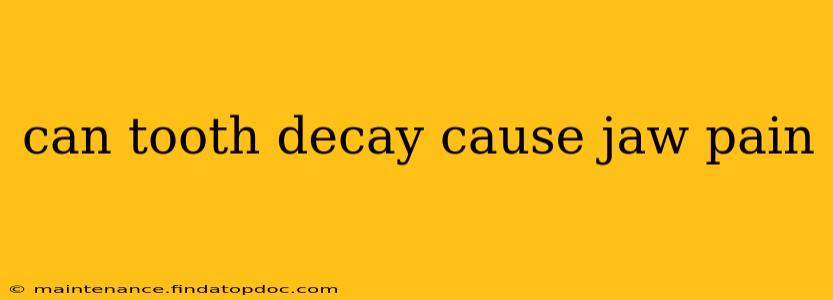Yes, tooth decay can absolutely cause jaw pain, although it's not always a direct or immediate cause. The connection is often indirect and involves other issues stemming from the decay itself. Understanding this relationship is crucial for early diagnosis and effective treatment. This post will explore the various ways tooth decay can lead to jaw pain and what you can do about it.
How Does Tooth Decay Lead to Jaw Pain?
Tooth decay, or cavities, are caused by bacteria that break down the tooth enamel. This process can lead to several problems that subsequently cause jaw pain:
-
Infection: Severe tooth decay can result in an infection of the tooth's pulp (the inner part containing nerves and blood vessels). This infection, known as pulpitis, can spread to the surrounding tissues, including the jawbone, causing significant pain and inflammation. The pressure from the infection can also radiate to the jaw, causing discomfort.
-
Abscesses: An untreated infection can lead to an abscess, a pocket of pus that forms at the root of the tooth. This abscess puts intense pressure on the surrounding bone and tissues, leading to severe jaw pain that may radiate to the ear, temple, or neck.
-
Temporomandibular Joint (TMJ) Disorder: While not a direct result of decay, severe tooth decay and the resulting need for extensive dental work (extractions, fillings, crowns) can sometimes exacerbate or trigger Temporomandibular Joint (TMJ) disorders. TMJ disorders involve the jaw joint and the muscles that control jaw movement. Malocclusion (improper bite), caused by missing teeth due to decay, can contribute to TMJ pain.
-
Gum Disease: Untreated cavities can contribute to gum disease (periodontitis). Inflammation and infection of the gums can spread to the jawbone, leading to pain and discomfort.
-
Referred Pain: Sometimes, pain from a decaying tooth can be felt in the jaw due to nerve pathways. The brain may interpret pain originating from the tooth as pain in the jaw, even though the jaw itself isn't directly affected.
What Are the Symptoms of Jaw Pain Related to Tooth Decay?
Jaw pain linked to tooth decay can manifest in various ways:
- Sharp, throbbing pain: This often indicates an infection.
- Dull, aching pain: This is more common with chronic issues like TMJ disorders or gum disease.
- Pain that worsens when chewing or biting: This points to a problem with the affected tooth or teeth.
- Pain that radiates to the ear, temple, or neck: This strongly suggests an infection or abscess.
- Swelling or tenderness in the jaw: This is a clear sign of inflammation.
How is Jaw Pain from Tooth Decay Diagnosed?
A dentist will conduct a thorough examination of your teeth and gums, including X-rays to check for cavities, infections, or abscesses. They may also assess your bite and jaw movement to rule out TMJ disorders. A proper diagnosis is crucial for effective treatment.
What Treatments Are Available?
Treatment depends on the severity of the tooth decay and any related complications. Options include:
- Fillings: To repair small cavities and prevent further damage.
- Root canal therapy: To treat an infected tooth pulp.
- Extraction: To remove severely decayed teeth.
- Antibiotics: To fight infections.
- Pain relief medication: To manage pain and inflammation.
- TMJ therapy: For jaw joint disorders.
Can I Prevent Jaw Pain Related to Tooth Decay?
Absolutely! Practicing good oral hygiene is key:
- Brush twice daily: Using fluoride toothpaste.
- Floss daily: To remove plaque and food particles between teeth.
- Visit your dentist regularly: For checkups and professional cleanings.
Ignoring tooth decay can have serious consequences, including jaw pain, infections, and even tooth loss. Regular dental checkups are essential for early detection and prevention of these problems.
What if I have jaw pain, but no obvious toothache?
Even without a noticeable toothache, jaw pain can still originate from a dental problem. Decay in molars, for example, might not cause direct tooth pain but can contribute to jaw discomfort through inflammation or infection spreading to surrounding structures. It's crucial to see a dentist for a proper evaluation. They can identify the source of your pain, even if it's not immediately apparent.
How long does it take for tooth decay to cause jaw pain?
The timeframe varies greatly depending on the severity of the decay and individual factors. Minor cavities may not cause jaw pain at all, while a severe infection can lead to jaw pain quite quickly. In some cases, it might take weeks or months for the effects of untreated decay to manifest as jaw pain.
Could something other than tooth decay cause jaw pain?
Yes, many other conditions can cause jaw pain, including TMJ disorders, arthritis, sinusitis, and even stress. This highlights the importance of a thorough dental and medical examination to identify the correct cause and receive appropriate treatment.
Remember, seeking professional dental care is crucial if you experience jaw pain. Early intervention can often prevent serious complications and minimize discomfort.
